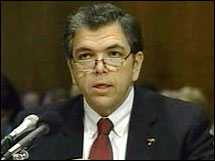Citigroup's shares still fail to impressCiti's been active in addressing investor concerns about cost-cutting and growth, but investors are holding back.NEW YORK (CNNMoney.com) -- With a new cost-cutting initiative underway and a series of well-received international acquisitions under its belt, Citigroup finally seems to be taking the aggressive actions Wall Street has been calling for to pump up the company's drifting stock price. So far Citi's strategic initiatives have yet to drum up investor enthusiasm, leaving the stock hopelessly mired in a trading range. For the past three years Citigroup (Charts)'s stock has been trapped around $50 a share.
The stock briefly jumped to $57 in December - its 52-week high - but couldn't sustain that momentum. Skittish investors dumped Citi's shares after it was announced that CFO Sallie Krawcheck would leave her post as CFO to head Citi's wealth-management business. That unit's chief, Todd Thomson, quit abruptly as questions were raised about his corporate expenditures and his relationship with CNBC host Maria Bartiromo. Still, with shares trading at $53 and 11.6-times its 2007 earnings, analysts say Citigroup's stock is the kind of undervalued bargain that savvy - but patient - investors may want to load up on. "We believe Citigroup is an attractive stock for investors," said Frank Braden, equity research analyst at Standard & Poors, who has a price target of $63 on the stock. "There are a lot of inherent advantages Citigroup has over its competitors, and it's moving in the right direction" to address some its shareholders' concerns. Moving to cut costs For instance, Citigroup was heavily criticized by Wall Street in 2006 because its expenses were fast outpacing its revenues, cutting into the bottom line. So in late December, the company announced a cost-cutting initiative to be spearheaded by Bob Druskin, chairman of Citigroup's flagship corporate and investment bank. The plan called for Druskin to submit a review of expenses by the end of the first quarter and then create a detailed plan to rid the company of redundancies and unnecessary expenses across its international operations. By implementing a strategic plan to battle the bleed, analysts said the company - which some contend has recently been overly cautious in implementing any plan of action - was aggressively taking control of the situation. And the hope is that the cost reductions could translate into some higher stock returns down the road. "Investors have been impatient with the stock and the management," Braden said. "A lot is riding on the cost-cutting initiatives." Investors are also looking to see whether Citigroup will return to its roots and make the kind of splashy, big-name acquisitions - such as its 1998 merger with Travelers - that it was famous for under the rule of former chief executive Sanford Weill. With Weill at the helm, Citigroup was known as a big risk-taker, which delivered heady returns for investors. But that risk-taking also led to some run-ins with regulators both in the U.S. and abroad. Current chief executive Charles Prince came on board in 2003 to clean up Citigroup's tarnished reputation after the scandals at Enron and WorldCom cost the company $4 billion to settle shareholder lawsuits. Prince also repaired Citigroup's relationship with Japan's regulators, who shut Citi's private banking unit there after evidence emerged that the unit was guilty of securities violations. Prince publicly bowed in apology for Citigroup's mistakes in Japan. Tackling investors growth concerns While Prince was hailed for his dedication to corporate governance, Wall Street worried his new emphasis would curb risk-taking and hinder growth. But in recent months, Prince has shown a determination to grow Citi through smaller, more targeted acquisitions rather than via colossal mergers. Among its recent buys were European Internet bank Egg Banking PLC, UK-based wealth advisory firm Quilter and the Central American subsidiaries of financial firm Grupo Cuscatlan. Craig Woker, analyst at Morningstar, said it's going to take time for Prince to convince his shareholder base that targeted acquisitions aimed at building onto the company's already successful business lines will foster more growth in the future. "There has been a lack of communication in really delivering that message to shareholders," Woker said. "They've got a core group of premier businesses that throw off a lot of profit and it may not be such a bad thing to milk a cash cow." Woker added that the company's strategy of making small add-on acquisitions, particularly on the international front, will help the company grow in a manner that won't put a damper on earnings. Speaking at a conference in late January, Prince said Citigroup plans to grow more aggressively internationally, with the goal that its global businesses will ultimately account for about 60 percent of its revenue. Currently, Citigroup's international business accounts for about 45 percent of its total revenue. For investors, that strategy could translate into a higher stock price. In the meantime, however, Citigroup is still struggling to break out of its trading range. And that's in part due to the uncertainty surrounding the company's current management turmoil. Sallie Krawcheck will leave the CFO position to as soon as a replacement for her is found, and Prince has said he expects to have a new finance chief installed by mid-March. "Investors will be looking at that selection carefully," said Standard & Poor's Braden. "A lot is going to depend on who they place as CFO and whether (that person) will be able to instill more confidence in the firm." Still Braden said with the initiatives Citigroup's already underway, investors should consider jumping into the stock at current levels. "There may be a good deal of uncertainty, but things are finally shaking themselves out," Braden said. ---------------------------------------------------------- |
Sponsors
|

